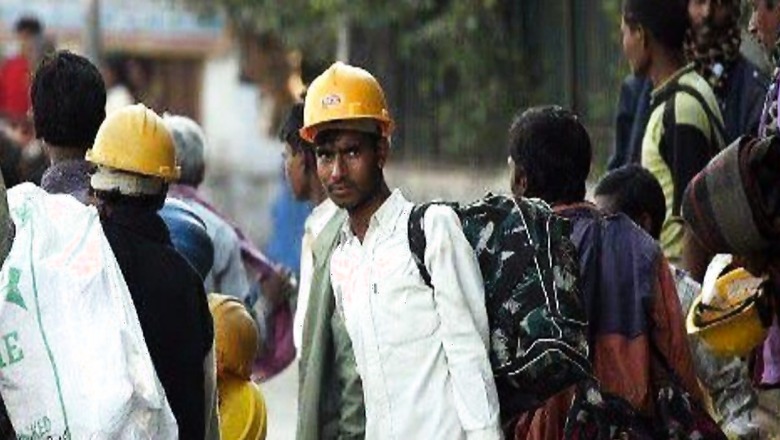
views
India’s job crisis is real and here to stay for the foreseeable future. If not addressed soon, India could end up in a far worse situation than China finds itself in right now. Despite China becoming the manufacturing hub of the world in the 21st century, the country is now grappling with a demographic crisis of its own making, where people are growing old before getting any richer. There are signs that India could be heading in the same direction much before it even finds itself positioned in a middle-income trap. Therefore, it is now time to get real and address some structural challenges that afflict India and its ability to generate jobs. After all, if India were to squander away the might of its youth demography by not being able to provide ample jobs, history will indeed remember these years as tragic.
India has the world’s largest population with an estimated workforce of 600 million people. The first hard pill to swallow is this: there can never be enough jobs for all. Even if the unemployment rate were to be brought down to 5%, there would still be about 30 million people without a job – assuming that the size of the workforce itself remains static at 600 million. Second, the government cannot provide jobs to all. The public sector provides just about 40 million jobs, and the scope of this increasing substantially is close to nil. At best, the government can facilitate the creation of new employment avenues by working alongside the private sector. The private sector, in turn, must do its part by investing heavily in research and development (R&D). At present, the government does much of the research-related heavy lifting. That is neither sustainable nor desirable in a country aiming to become a developed nation by 2047.
The odds are stacked against India’s youth. An Indian Labour Organisation (ILO) study released earlier this year revealed that nearly 83% of India’s unemployed population belongs to the youth demographic. Essentially, acquiring a secondary education and then securing graduate and postgraduate degrees is no longer a guarantee that you will be able to land a job.
For long, parents would push their children to study hard and score good marks. That was when education did, in fact, ensure employment. That is no longer the case. In fact, if the recent ILO study is anything to go by, the chances of an educated youth remaining jobless are much higher than those who stay away from formal education. That should send warning bells ringing across the country. A few years down the line, in the absence of concrete measures to address India’s unemployment woes, poor and underprivileged parents could grow averse to the idea of spending on their child’s education altogether. Where that will take India in the long run is anybody’s guess.
Dismantle And Rebuild India’s Education System Now!
The bottom line is this: India’s education system is no longer in a position to uplift people. It may help them read, write, calculate and know a little about the world around them, but beyond that, the education system in its present form does little to equip students for either the job market or for capitalising on their entrepreneurial minds. We remain a country where the only way a student climbs up the education ladder is by rote learning. The ill effects of an entire generation mugging up textbooks to pass exams are now becoming visible, as employers complain of not being able to find suitable and skilled candidates to fill their workforce with. In a world where technology, and more recently, artificial intelligence is taking centre stage, humans are of little to no use to employers if all that they have to offer are generic degrees and bare-minimum skills.
India’s education system in its present form lays little to no emphasis on skill development, mostly because this is a complex and long process that has to be sustained over the years. It requires the identification of students’ core strengths and getting teachers to help them build on these. As a concept, this approach remains alien to a majority of Indian schools and colleges. It is no surprise, therefore, that schools and colleges are churning out hordes of graduates with largely similar aptitude levels and close to no mastered skills.
Remember, skill is the keyword. Without it, nobody should expect a job to land on their laps. The data relating to India’s skill deficit is hardly inspiring. As per the India Skills Report, close to 49% of Indian youth are unemployable. That means 1 out of every 2 Indians is now unfit for employment. According to the National Employability Report for Engineering, about 80% of Indian engineers do not possess the skills needed in their field of work. That is the scale at which the Indian education system has failed our youth.
Skill India is among the Modi government’s most ambitious initiatives. However, it will yield results only when it is institutionalised in all Indian schools and colleges as a mandatory part of curricula. The curricula of schools and colleges require a complete overhaul. Today, Indian students deserve a syllabus more in sync with the times they live in, and not what was handed over to us by our colonisers. Formal education curricula must be designed in a way that lays emphasis on skills that are in demand in the job market. The curricula, in turn, must be dynamic and flexible based on emerging market demands. Finally, the era of generic degrees is over. Bachelor’s and Master’s degrees in generic fields no longer land the youth anywhere close to a job. That is itself a tell-tale sign of how the job market has pivoted towards individuals who have skilled technical and vocational expertise to offer and not marksheets in which the scores are all a product of rote learning and mugging up.
The National Education Policy (2020) laid out the broad contours of how the system must lay special emphasis on skill development. However, forward movement on that front is absent, and students continue being fed absolutely outdated and colonial syllabi in the name of education with little to no practical application in the modern world where AI is humans’ biggest competitor.
The Coaching Scam
Finally, the government must crack down hard on the commercialisation of the education sector. Coaching institutes have popped up across the country like there is no tomorrow. These coaching centres promise students a lot – from teaching them the ability to crack competitive exams to even helping them land jobs. Most of this is largely a scam aimed at financially capitalising on the desperation of India’s youth.
What such commercialisation has done is convince large swathes of the youth that cracking competitive exams and getting a job is all contingent on them paying handsome fees to such coaching centres. Now the question arises, why are graduates flocking to these coaching centres? Simply because the education system of India failed them. It failed them on more counts than one can put into words. What schools and colleges could not offer students; they are now looking for in coaching institutes. This is why India’s education system must be completely overhauled. In the absence of that, we are all in a race to the bottom.

















Comments
0 comment